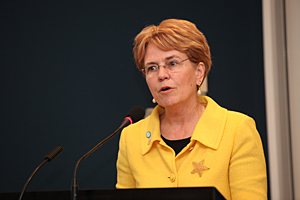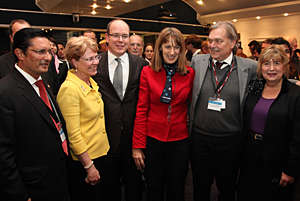

ADVERTISEMENT
- Rozovsky wins prestigious NSF Early Career Award
- UD students meet alumni, experience 'closing bell' at NYSE
- Newark Police seek assistance in identifying suspects in robbery
- Rivlin says bipartisan budget action, stronger budget rules key to reversing debt
- Stink bugs shouldn't pose problem until late summer
- Gao to honor Placido Domingo in Washington performance
- Adopt-A-Highway project keeps Lewes road clean
- WVUD's Radiothon fundraiser runs April 1-10
- W.D. Snodgrass Symposium to honor Pulitzer winner
- New guide helps cancer patients manage symptoms
- UD in the News, March 25, 2011
- For the Record, March 25, 2011
- Public opinion expert discusses world views of U.S. in Global Agenda series
- Congressional delegation, dean laud Center for Community Research and Service program
- Center for Political Communication sets symposium on politics, entertainment
- Students work to raise funds, awareness of domestic violence
- Equestrian team wins regional championship in Western riding
- Markell, Harker stress importance of agriculture to Delaware's economy
- Carol A. Ammon MBA Case Competition winners announced
- Prof presents blood-clotting studies at Gordon Research Conference
- Sexual Assault Awareness Month events, programs announced
- Stay connected with Sea Grant, CEOE e-newsletter
- A message to UD regarding the tragedy in Japan
- More News >>
- March 31-May 14: REP stages Neil Simon's 'The Good Doctor'
- April 2: Newark plans annual 'wine and dine'
- April 5: Expert perspective on U.S. health care
- April 5: Comedian Ace Guillen to visit Scrounge
- April 6, May 4: School of Nursing sponsors research lecture series
- April 6-May 4: Confucius Institute presents Chinese Film Series on Wednesdays
- April 6: IPCC's Pachauri to discuss sustainable development in DENIN Dialogue Series
- April 7: 'WVUDstock' radiothon concert announced
- April 8: English Language Institute presents 'Arts in Translation'
- April 9: Green and Healthy Living Expo planned at The Bob
- April 9: Center for Political Communication to host Onion editor
- April 10: Alumni Easter Egg-stravaganza planned
- April 11: CDS session to focus on visual assistive technologies
- April 12: T.J. Stiles to speak at UDLA annual dinner
- April 15, 16: Annual UD push lawnmower tune-up scheduled
- April 15, 16: Master Players series presents iMusic 4, China Magpie
- April 15, 16: Delaware Symphony, UD chorus to perform Mahler work
- April 18: Former NFL Coach Bill Cowher featured in UD Speaks
- April 21-24: Sesame Street Live brings Elmo and friends to The Bob
- April 30: Save the date for Ag Day 2011 at UD
- April 30: Symposium to consider 'Frontiers at the Chemistry-Biology Interface'
- April 30-May 1: Relay for Life set at Delaware Field House
- May 4: Delaware Membrane Protein Symposium announced
- May 5: Northwestern University's Leon Keer to deliver Kerr lecture
- May 7: Women's volleyball team to host second annual Spring Fling
- Through May 3: SPPA announces speakers for 10th annual lecture series
- Through May 4: Global Agenda sees U.S. through others' eyes; World Bank president to speak
- Through May 4: 'Research on Race, Ethnicity, Culture' topic of series
- Through May 9: Black American Studies announces lecture series
- Through May 11: 'Challenges in Jewish Culture' lecture series announced
- Through May 11: Area Studies research featured in speaker series
- Through June 5: 'Andy Warhol: Behind the Camera' on view in Old College Gallery
- Through July 15: 'Bodyscapes' on view at Mechanical Hall Gallery
- More What's Happening >>
- UD calendar >>
- Middle States evaluation team on campus April 5
- Phipps named HR Liaison of the Quarter
- Senior wins iPad for participating in assessment study
- April 19: Procurement Services schedules information sessions
- UD Bookstore announces spring break hours
- HealthyU Wellness Program encourages employees to 'Step into Spring'
- April 8-29: Faculty roundtable series considers student engagement
- GRE is changing; learn more at April 15 info session
- April 30: UD Evening with Blue Rocks set for employees
- Morris Library to be open 24/7 during final exams
- More Campus FYI >>
9:17 a.m., Dec. 23, 2009----Oceans Day at the United Nations Framework Convention on Climate Change (UNFCC) this month brought together 320 leaders from 40 countries, representing governments, U.N. agencies, non-governmental organizations, the scientific community, and industry to focus on the direct link between climate change, ocean health, and human well being.
During the Dec. 14 event -- co-sponsored by the Global Forum on Oceans, Coasts, and Islands, housed at UD -- world leaders affirmed the urgent need to protect the central role of oceans in Earth's life support system and address threats facing coastal and island communities.
The nearly 50 percent of the world's population living in coastal areas will suffer disproportionately from climate change impacts such as ocean warming, sea-level rise, extreme weather events, and ocean acidification, attendees said. The effects of such changes are expected to be wide ranging and include loss of food security and threats to the diversity of ocean wildlife.
“The powerful link between oceans and climate is too often a neglected one,” said Monique Barbut, CEO of the Global Environment Facility. “When you protect the oceans you protect the planet.”
Attendees also noted the need for climate talks to rely on marine research in addition to terrestrial and atmospheric science.
“Today, as never before, we better comprehend the connections between healthy oceans and healthy people, and the myriad interactions among land, air, fresh water, ocean, ice, and human activities,” said U.S. National Oceanic and Atmospheric Administration head Jane Lubchenco.
In light of these concerns, Oceans Day participants underscored a list of important considerations for future UNFCC talks.
The group agreed that UNFCCC negotiating text should recognize that oceans, which make up 70 percent of Earth, play a central role in climate.
“Oceans are sources of food, industry, and energy,” said Prince Albert II of Monaco. “They are the lungs of our planet, precious generators of oxygen. They are indispensable thermo-regulators that attenuate climate change by absorbing (the greenhouse gas carbon dioxide).”
Participants also agreed that here is a need to craft an integrated oceans and coasts program within the UNFCCC by 2013 emphasizing the following major elements:
- Proceed with utmost caution to ensure the continuing functioning of the ocean in sustaining life on Earth by adopting the most stringent reductions in greenhouse gas emissions within a short timeframe to avoid disastrous consequences on oceans and coastal communities around the world;
- Emphasize the positive contribution that oceans can play in mitigation of global warming, such as: using natural carbon sinks such as mangroves and kelp forests in coastal areas; capturing and storing carbon through injection into deep seabed geological formations; taking further measures to reduce air pollution from ships; and developing ocean-based renewable energy from sources such as wind, currents, and tides;
- Provide sufficient funding to support adaptation to the effects of climate change for coastal and island communities that are at the frontline of climate change in 173 coastal countries; and
- Create strategies in coastal communities and island nations that encourage ecosystem-based adaptation, increase the resilience of key coastal and marine ecosystems, and are implemented through integrated coastal and ocean management institutions and processes at local, national, and regional scales.
Additionally, the global oceans community will develop a comprehensive set of recommendations related to climate and oceans and coasts, said Biliana Cicin-Sain, co-chair of the Global Forum on Oceans, Coasts, and Islands, and director of UD's Gerard J. Mangone Center for Marine Policy.
The recommendations will be the subject of discussions at the Global Oceans Conference 2010, to be held at UNESCO in Paris and co-sponsored by the Global Forum, the government of France, and UNESCO.
The Global Forum is housed in UD's College of Earth, Ocean, and Environment.
Article by Elizabeth Boyle
Photos by Jonas Løvstad


